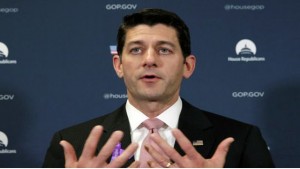 Donald Trump and House Speaker Paul Ryan met for the first time Thursday in a much-anticipated meeting to address the Republican party rift over the former’s position as presumptive nominee. Yahoo Senior Politics Correspondent Jon Ward will discuss the Trump-Ryan meet live at 11:15 a.m. ET with Global News Anchor Katie Couric. Tune in here.
Donald Trump and House Speaker Paul Ryan met for the first time Thursday in a much-anticipated meeting to address the Republican party rift over the former’s position as presumptive nominee. Yahoo Senior Politics Correspondent Jon Ward will discuss the Trump-Ryan meet live at 11:15 a.m. ET with Global News Anchor Katie Couric. Tune in here.
About a month before Paul Ryan became the Republican Party’s vice presidential nominee in the summer of 2012, then Sen. Tom Coburn mentioned Ryan’s name unprompted in the course of a wide-ranging conversation in his Capitol Hill office. “I had this conversation with Paul Ryan last night,” the Oklahoma senator, who retired in 2014, told me. “[Ryan] said, ‘Your book ‘Breach of Trust’ changed totally the way I operate.‘”
Coburn’s book, subtitled “How Washington Turns Outsiders into Insiders,” railed against careerism in Congress that leads senators and representatives to focus year in and year out on getting reelected, rather than fixing the country’s problems. Coburn wrote the book in 2003, and said the problem had only grown worse since then. “I am disgusted with Washington,” he told me.
But Ryan, a Wisconsin Republican, was to Coburn a rare bright spot on the horizon. Ryan had already established a reputation for putting his neck out on major issues by then. He first proposed major changes to Medicare and Social Security in 2008 — and then did so again every year after that. He was obsessed with the impact of these programs on the national debt, as was Coburn.
For years, Republican leaders in Congress ignored Ryan’s “roadmap” because its call to radically overhaul popular entitlement programs was seen as too politically risky, even if it only affected future and not current beneficiaries. By 2012, however, Ryan had succeeded in pushing his proposals long enough and hard enough that his party could no longer ignore them. They became part of the GOP’s budget plan in that presidential year, thanks in part to the energy and support of a new class of tea party House members.
Ryan had gotten a taste of what it meant to push controversial ideas through the political process, and to take on his own party, so he felt emboldened to do it even more forcefully, Coburn said. “He said, ‘I read your book, ‘Breach of Trust,’ and I said, ‘I’m tired of living the lie. I want to be free.’ So I’m going to do what I think and defend what I think, even if it’s painful,” Coburn recounted.
A month later, Ryan was plucked from the relative obscurity of Congress and placed under the searing lights of the national stage when Mitt Romney made him his running mate. Ryan’s calling card was his focus on budget and entitlement matters. But his four-month stint as a national candidate convinced him of the need for the GOP to do more to reach voters outside the party’s narrow traditional constituency of older, wealthier, white voters.
When Ryan talked about expanding the party, he thought largely of minority voters, who represent the demographic future of the country. Other conservatives argued the party could or should seek to win over disaffected white working-class voters who did not feel at home in either the Democratic or Republican parties. Donald Trump, of course, is now the Republican nominee for president, having won over voters who resent free trade, are angry about illegal immigration and hate the Washington elite.
Ryan is quickly becoming public enemy No. 1 for Trump’s outrage-fueled supporters, after his refusal to initially back the businessman and former reality TV star. Ryan’s resistance is built on his concern that Trump has no regard for constitutional checks on the power of the presidency, and the two will hash out their differences today in a meeting at the Republican National Committee.
